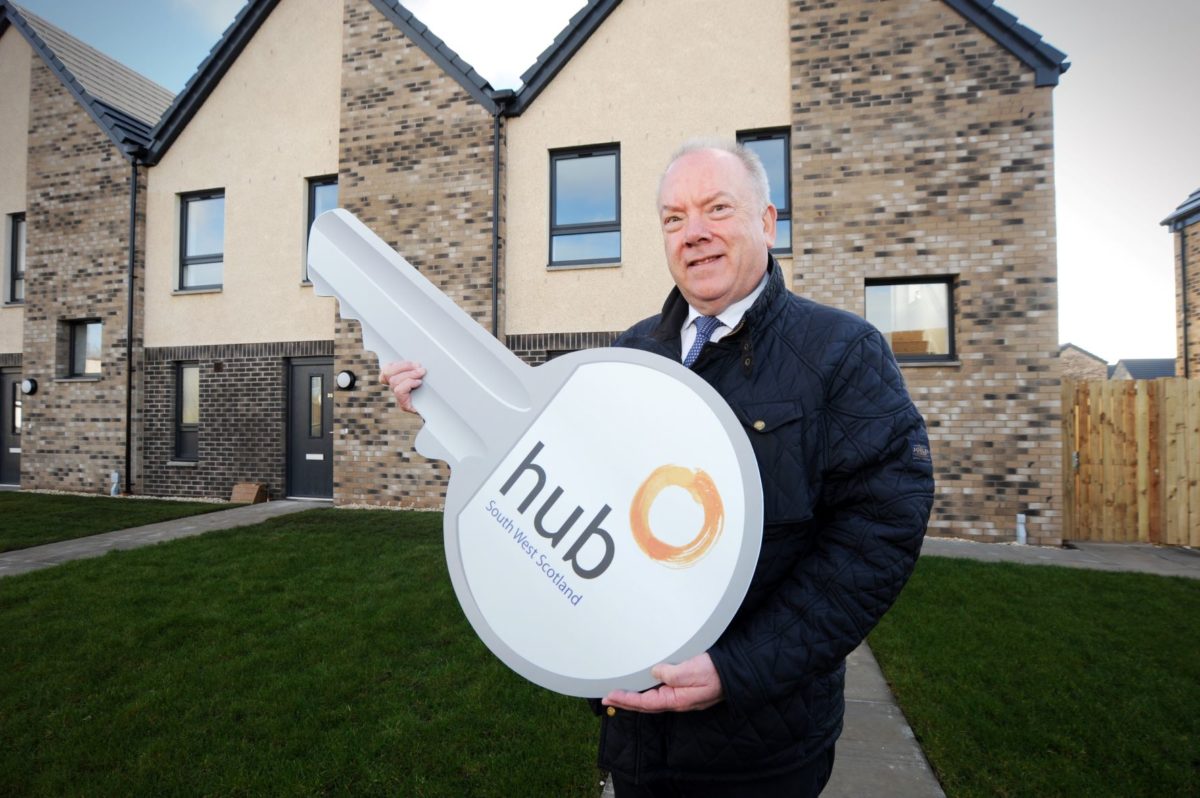
By Dr Willie Mackie, chair of hub South West Scotland
In any large organisation, it is easy to become engrossed in the detail, but every so often an event occurs which perfectly illustrates the bigger picture, and vividly highlights the common goal towards which everyone is pulling.
One such incident was the small ceremony this month which marked the completion of the 500th home that hub South West had handed over since it became a very new entrant in the social housing market with its first-ever completion just three years previously.
The day recognised a remarkable achievement by a team which brings dedication, determination and expertise to every endeavour in which it is involved. And it was embellished by the news that financial close will be reached in a few months on the hub’s 1000th home.
But more than that – more than a corporate target met, and more than a milestone on the journey as a development partner – was the clear evidence that what hub South West is actually doing in its territory is steadily changing people’s lives for the better.
It is not too mawkish to say this, but the smiles on the faces of the residents at Heatherstane Way, Irvine, part of the major Towerlands project for North Ayrshire Council which is being built by Ashleigh Construction, told their own story.
As they came to see what we were up to with our clicking cameras, they told us how bowled over they were with their new homes – with the quality of the build, with their first-class energy efficiency and with the sense of community which they brought to the area.
Delivering back into the community is one of the fundamental reasons that hub South West embarked on social housebuilding in the first place.
As a development partner with our local authority participants in Ayrshire, Lanarkshire and Dumfries and Galloway, we have invested, through our housing forum, in close, productive and long-term relationships with our construction partners such as Ashleigh, CCG, Cruden and McTaggarts.
Such proven relationships with Tier 1 contractors have, over the years, successfully delivered hundreds of millions of pounds worth of education, healthcare, early years, leisure and office infrastructure.
The community investment model, based on collaborative working and in tune with the Scottish Government’s net zero and decarbonisation agenda, made a diversification into housing provision for these trusted partners a natural follow-on to our core activities.
A significant part of the attraction for participants has been that, since its inception in 2012, the hub team has been offering added value such as its Building for Growth programme, the hub Club, Meet the Buyer events, Skills Academy and apprenticeship support.
This holistic approach has made it easier for local contracting companies not only to gain access to the participants’ housing programmes but also to meet and interact with Tier 1 contractors with whom previously it was challenging to get a seat at the same table.
Housebuilding can also be a more realistic opportunity for smaller local enterprises, which might not have the capacity or workforce to undertake a complex project such as a community education campus incorporating existing schools and early years provision.
Engaging with local authority partners in long-term build programmes not only allows local companies to gain expertise in bigger projects but brings a coherence to strategic forward planning which is absent in short-term, stop-start frameworks.
Just as important, hub South West’s unique approach consistently applies our criteria of value for money, quality build and sustainability know how into the housing market.
The next major milestone on hub South West’s house-building journey will be to encourage the participation of Registered Social Landlords (RSLs), of whom there are some 160 in Scotland and who are the main providers of social housing.
While the local authority pipeline is already healthy, the participation of the hub as a development partner with RSLs would massively broaden its impact and identify where it could build to maximum social and community benefit.
Such an alliance would be a strategic opportunity not only to build on key strengths of partnership working and delivery of economic value, but also to provide a greatly-to-be-desired security and visibility of supply for the region’s supply chain, allowing it to plan ahead in the long- rather than the short-term.
Looking forward, the pace of the hub’s activity will only accelerate. It built 500 homes worth £101 million in three years. The next 500, I believe, will appear in a shorter time frame as expertise, experience and economies of scale develop and grow.
And more and more local families will have the chance to enjoy what we should all be entitled to…a warm, dry, comfortable and energy efficient home.








